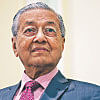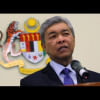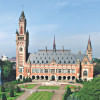Persecution Against Rohingyas: UN official warns of genocide trial
The top UN human rights official has expressed determination to see that the perpetrators of the horrors committed against the Rohingyas in Myanmar face justice.
Speaking to the BBC, Zeid Ra'ad Al Hussein, the UN High Commissioner for Human Rights, has not ruled out the possibility that Myanmar's civilian leader Aung San Suu Kyi and the head of the armed forces Gen Aung Min Hlaing could find themselves in the dock on genocide charges sometime in the future.
He, however, did not say which court could prosecute suspected atrocities, according to excerpts of his interview provided in advance by the BBC, reports Reuters.
Myanmar is not a member of the International Criminal Court, so referral to that court could be done only by the UN Security Council. But Myanmar's ally China could veto such a referral.
Zeid said the attacks on the Rohingyas had been “well thought out and planned”, and he had asked Suu Kyi to do more to stop the military action.
He previously described the deaths and displacement of the Rohingyas as “a text book example of ethnic cleansing,” and asked rhetorically if anyone could rule out “elements of genocide”.
His latest remarks put the case plainly, toughening his stance.
“The elements suggest you cannot rule out the possibility that acts of genocide have been committed,” he said.
“It's very hard to establish because the thresholds are high,” he said. “But it wouldn't surprise me in the future if the court were to make such a finding on the basis of what we see.”
Myanmar denies committing atrocities against the Rohingyas and has rejected UN criticism for its “politicisation and partiality”. The Myanmar military says the crackdown is a legitimate counter-insurgency operation.
Zeid said Myanmar's “flippant” response to the serious concerns of the international community made him fear the current crisis “could just be the opening phases of something much worse”.
The UN defines genocide as acts meant to destroy a national, ethnic, racial or religious group in whole or in part. Such a designation is rare under international law, but has been used in contexts including Bosnia, Sudan and an Islamic State campaign against the Yazidi communities in Iraq and Syria.
Around 10 lakh Rohingyas have fled to Bangladesh, including about 660,000 who arrived in the country after August 25, when the Myanmar military launched a brutal crackdown in Rakhine.
UN investigators have heard Rohingya testimony of a “consistent, methodical pattern of killings, torture, rape and arson”.
Zeid said he had phoned Suu Kyi in January, asking her in vain to stop the military operation.
Nobel peace laureate Suu Kyi's less than two-year old civilian government has faced heavy international criticism for its response to the crisis, though it has no control over the generals it has to share power with under Myanmar's transition after decades of military rule.
MYANMAR DELEGATION ARRIVES
A six-member Myanmar delegation arrived in Dhaka yesterday to finalise the formation of crucial Joint Working Group that will oversee the repatriation of the Rohingyas who have fled to Bangladesh from Myanmar.
Permanent Secretary at Myanmar foreign ministry Myint Thu is heading the team which will meet the Bangladesh delegation led by Foreign Secretary Md Shahidul Haque at State Guesthouse Meghna at 8:30am today.
Sources said a specific instrument on the repatriation would be drawn up after reaching an agreement in a speedy manner. Both the countries may agree on further instruments, as needed, for successful completion of the repatriation.
Dhaka will put emphasis on empowering the joint working group so that it can finalise the modalities and handle the repatriation without any delay, said Bangladesh foreign ministry officials.
According to the repatriation deal signed between Dhaka and Naypyitaw on November 23, Myanmar has agreed to take necessary measures to halt the outflow of its residents to Bangladesh, restore normalcy in northern Rakhine and encourage those who had left Myanmar to return voluntarily and safely to their own households and original places of residence or to a safe place of their choice.
The deal says Bangladesh will provide whatever data it can obtain on the displaced Rohingyas who left Myanmar after October 9 last year.
Based on the list of returnees or information provided by Bangladesh, the Myanmar government will accept all people along with their family members after verification, reads the agreement.
HRW'S STATEMENT
Myanmar continued to destroy Rohingya villages even days after signing the refugee resettlement deal with Bangladesh, says Human Rights Watch.
Satellite images of Myanmar published by the New York-based right watchdog yesterday revealed destruction in 40 Rohingya villages since October.
Analysis of satellite imagery reveals new destruction of Rohingya villages between October and November this year in northern Rakhine, it said.
During this period, thousands more Rohingyas fled to Bangladesh from Myanmar.
Satellite imagery confirms that dozens of buildings were burned the same week Myanmar and Bangladesh signed the deal on November 23 to begin repatriation of Rohingyas within two months.
According to the HRW, at least 354 villages, including the 40, have been partially or completely destroyed since August 25.
On November 25, satellite data detected an active fire and building destruction in Myo Mi Chang village in Rakhine's Maungdaw Township. Four villages suffered building destruction between November 25 and December 2.
“The Burmese army's destruction of Rohingya villages within days of signing a refugee repatriation agreement with Bangladesh shows that commitments to safe returns were just a public relations stunt,” said Brad Adams, Asia director at the HRW.
“The satellite imagery shows what the Burmese army denies: that Rohingya villages continue to be destroyed. Burmese government pledges to ensure the safety of returning Rohingya cannot be taken seriously.”
The HRW has used satellite imagery to assess and monitor over 1,000 villages and towns in the townships of Maungdaw, Buthidaung, and Rathiduang, where the Myanmar military and vigilantes have engaged in attacks on Rohingyas.

 For all latest news, follow The Daily Star's Google News channel.
For all latest news, follow The Daily Star's Google News channel. 







Comments